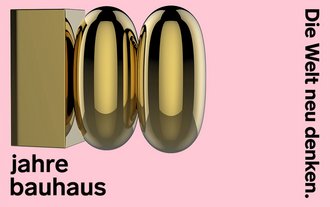To mark the 100th anniversary of BAUHAUS, every second bus stop in Weimar had a poster with the cheerful call to rethink the world – so the question is, what does rethinking the world actually mean 100 years after it was founded?
In 1993, Lucius Burckardt said in his founding speech for today's Faculty of Art and Design that the Bauhaus could neither be imitated nor repeated, but that only one thing still applies to the Bauhaus today: tackling where it is needed. He meant this not so much in economic or stylistic terms, but in terms of shaping society, in the sense of solidarity and ecology, BAUHAUS means research into cultural and political change. In this context, design functions as a vehicle for the reorganisation of society.
Today's Bauhaus offers scope for new visions of life beyond the interests of economic exploitation, prioritising humanity and sustainability; it offers a testing ground for joint and open-ended experiments in lifestyle change. The artistic design disciplines complement the familiar research into materials and technologies with forward-looking research into consumption and behaviour with regard to the development of a sustainable lifestyle.

